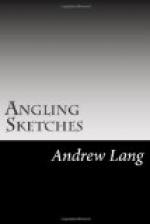These are the waters with which our boyhood was mainly engaged; it is a pleasure to name and number them. Memory, that has lost so much and would gladly lose so much more, brings vividly back the golden summer evenings by Tweedside, when the trout began to plash in the stillness—brings back the long, lounging, solitary days beneath the woods of Ashiesteil—days so lonely that they sometimes, in the end, begat a superstitious eeriness. One seemed forsaken in an enchanted world; one might see the two white fairy deer flit by, bringing to us, as to Thomas Rhymer, the tidings that we must back to Fairyland. Other waters we knew well, and loved: the little salmon-stream in the west that doubles through the loch, and runs a mile or twain beneath its alders, past its old Celtic battle-field, beneath the ruined shell of its feudal tower, to the sea. Many a happy day we had there, on loch or stream, with the big sea-trout which have somehow changed their tastes, and to-day take quite different flies from the green body and the red body that led them to the landing-net long ago. Dear are the twin Alines, but dearer is Tweed, and Ettrick, where our ancestor was drowned in a flood, and his white horse was found, next day, feeding near his dead body, on a little grassy island. There is a great pleasure in trying new methods, in labouring after the delicate art of the dry fly-fisher in the clear Hampshire streams, where the glassy tide flows over the waving tresses of crow’s-foot below the poplar shade. But nothing can be so good as what is old, and, as far as angling goes, is practically ruined, the alternate pool and stream of the Border waters, where
The
triple pride
Of Eildon looks over Strathclyde,




